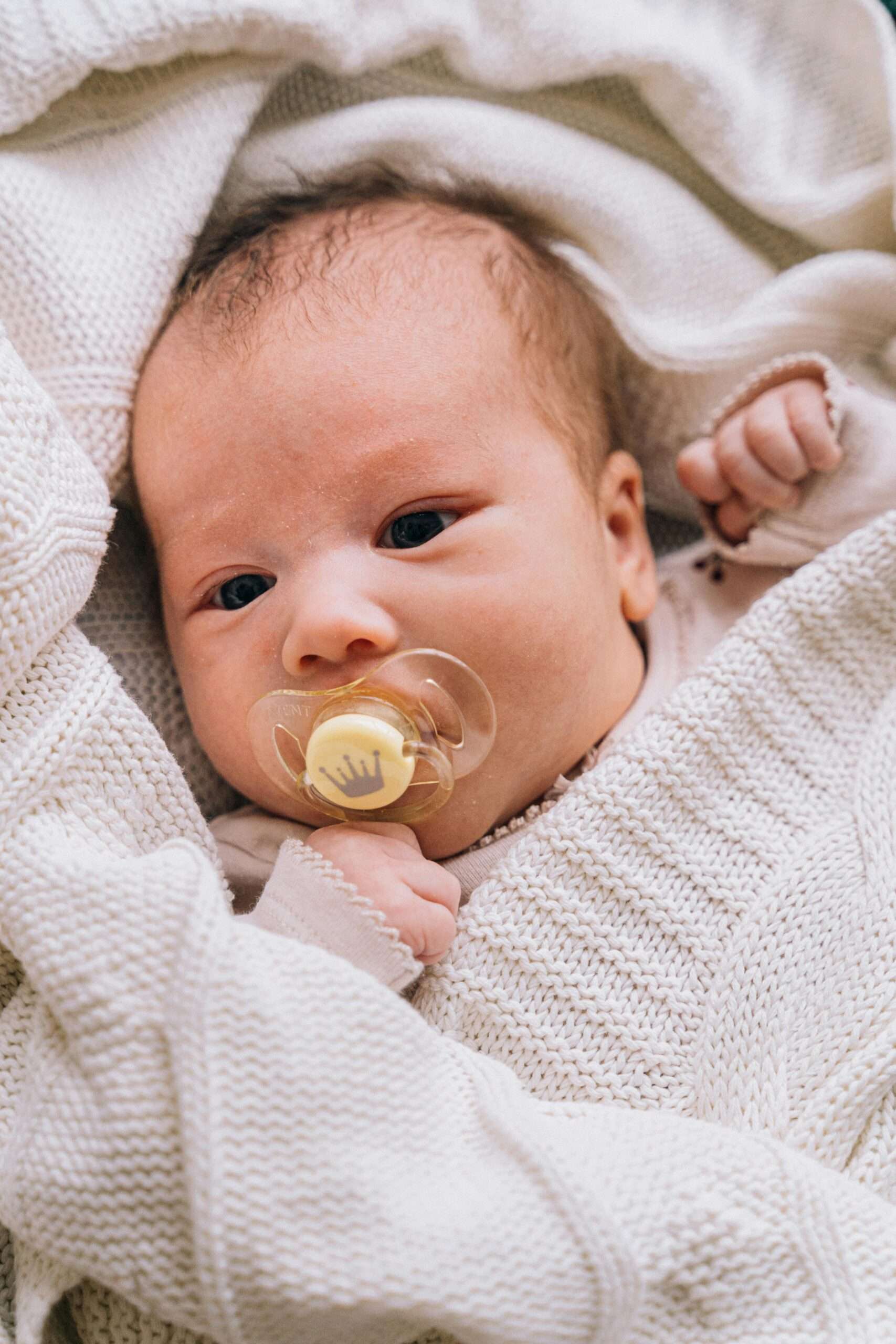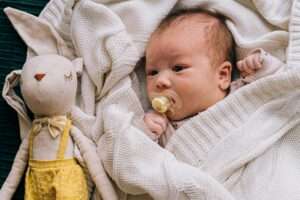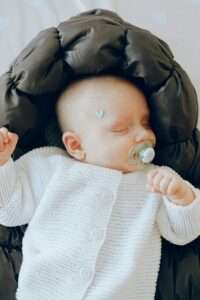Newborn Sleep with a Pacifier – Safety Tips for Parents
- Dr Owais Rafiq
- October 30, 2024
- 4:48 pm

Newborn Sleep with a Pacifier – See How to Keep Your Baby Safe While Sleeping
Does your newborn sleep with a pacifier? Is it okay to use? Many parents wonder if it’s safe. The good news? Pacifiers help soothe your baby to sleep and even lower the risk of SIDS (sudden infant death syndrome). Still, since babies are delicate and sensitive, it’s important to use them correctly and cautiously.
Here’s everything you need to know about using a pacifier safely for your newborn.

What Problems Can Pacifier Use Cause During Sleep?
While newborn sleep with a pacifier can be useful, there are some issues to watch out for if not managed properly. Knowing potential problems can help you prevent them.
- Disturbing sleep time: Your little one might wake up when the pacifier falls out, disrupting their sleep.
- Dental problems: Consistent pacifier use after age two can cause teeth misalignment.
- Ear infections: The risk of ear infections is linked with frequent pacifier use.
- Dependence: Your baby may fully start relying on the pacifier and not sleep without it.
- Nipple confusion: If you introduce a pacifier too soon (while breastfeeding), it can cause confusion for your baby.

To avoid these problems, see below how your newborn can sleep with a pacifier safely.
Who is at Risk for Problems with Pacifier Use?
Most newborn sleep with a pacifier safely, but some may be at higher risk for issues. Here are some babies who might face higher risks:
- Premature babies.
- Babies who often get ear infections.
- Families with a history of dental problems.
- Babies with allergies.
- Newborns with developmental delays.
Knowing these risk factors will help you stay cautious when using pacifiers.
Debunking Myths About Pacifier Use
Many myths about newborn sleep with a pacifier can confuse parents. Let’s separate myths from facts.
Myth 1: Pacifiers ruin babies’ teeth.
Fact Explained: Pacifiers are safe for teeth if used before age 2–3. Problems happen with long-term use. Stopping by age 3 prevents dental issues.
Myth 2: Pacifiers stop babies from breastfeeding.
Fact Explained: Pacifiers don’t hinder breastfeeding if introduced after 1 month. Breastfeeding should be well-established first. Babies can do both without trouble.
Myth 3: Pacifiers cause speech problems.
Fact Explained: Speech issues are rare. Long-term use, especially after age 2, may slow speech development. So, slowly stop letting your newborn sleep with a pacifier after 6 months of age.
Myth 4: Pacifiers hurt emotional growth.
Fact Explained: Pacifiers provide comfort without hindering emotional development. They help babies calm down. Just don’t overuse them.
How to Tell if the Pacifier is Causing Problems?
If something’s wrong, there are always some “tell signs”. If your newborn sleep with a pacifier, then watches out for the following.
- Frequent ear infections.
- Teeth misalignment.
- Dependency on the pacifier.
- Difficulty when feeding.
Catching these signs early can help you adjust pacifier use before bigger issues arise.
When Should You Get Medical Help?
Usually, pacifier-related problems are not serious, but in the following cases, it’s important to talk to a doctor.
- If your baby keeps getting ear infections.
- If your baby’s teeth seem misaligned or their bite is off.
- If your baby has trouble breathing while using the pacifier.
- If your baby has irritation in the mouth or gums.
- If your baby becomes crankier or shows unusual behavior.
How Can You Prevent Problems if Your Newborn Sleep with a Pacifier?
Ensuring safety is essential when using a pacifier at bedtime. Here’s how to use it safely:
1) Choose the Right Pacifier
- Pick the pacifier suitable for your infant’s age. Pacifiers are usually made for specific age groups, like, from birth to 3 months old or 3 to 6 months old.
- Choose a one-piece design. Those having multiple parts can be a choking hazard.
- Use one with ventilation holes to prevent suffocation.
2) Keep It Clean
- Always sterilize the pacifier or boil it, especially before first use. Clean it with warm soapy water daily before each use.
- Regularly check for wear and tear, as damaged pacifiers can break and be a choking risk.
3) Safe Pacifier Use During Sleep
- Never attach the pacifier to a string or clip around the baby’s neck or crib. These can cause strangulation.
- Breastfeeding mothers should avoid giving a pacifier. Just wait 3-4 weeks. Let your baby get used to breastfeeding first. But, for bottle-fed babies, you can use it right away.
4) Lay Your Baby on Their Back
Remember! Always put your newborn on their back while they sleep. It doesn’t matter if they are using a pacifier or not. This is the safest position for infants to reduce risk of SIDS (sudden infant death syndrome).
5) Let the Pacifier Fall Out Naturally
If the pacifier falls out during sleep, there’s no need put it back in. It’s safe to leave it out once your baby is asleep.
6) Follow Pacifier Guidelines from Pediatricians
- The American Academy of Pediatrics & Family Physicians, or AAFP, recommends using pacifiers at nap and bedtime. Because it can help lower the risk of SIDS. But avoid forcing your baby to take it if they don’t want to.
- Start reducing pacifier use after your baby turns one, aiming to stop by age two to prevent dental and speech problems.
7) Avoid Using Sweeteners
Never dip the pacifier in sugar, honey, or any sweetened liquid. This can lead to dental problems and pose other health risks.
8) Use Other Soothing Methods
If your baby is totally dependent on the pacifier, try other calming methods like rocking, singing, or a comforting blanket.
9) Watch for Dental Changes
Pay attention to your baby’s teeth as they develop. Speak to your dentist early if you notice changes.
10) Create a Soothing Environment
Make the sleeping space calming with soft lighting and white noise.
Following the steps mentioned above can help you prevent most of the pacifier-related problems, so your baby stays safe while sleeping.
Conclusion
Letting your newborn sleep with a pacifier might promote sounder sleep plus also decrease their chances of suffering from sudden infant death syndrome (SIDS). Still, pacifiers should be used with care. Slowly withdraw pacifier use in your child to avoid dependence. With the right approach, it can play a positive part in your baby’s sleep routine.
Dr Owais Rafiq
Subscribe to Dr Owais YouTube channel
For parenting advice, child health, symptoms, causes and treatment of illness in children.





